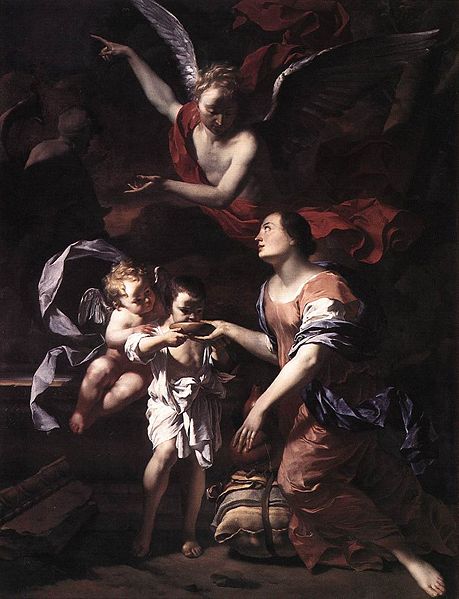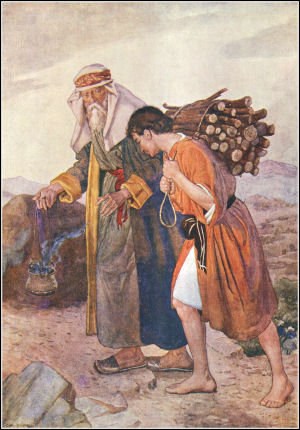On the third day of the defining chapter in Abraham's long life, the bible declares, "He lifted his eyes and saw the place (of sacrifice) afar off".
The language used suggests optimism, a change of posture from the grim stoop of the preceding two days. He had been downcast, now he looked up. What happened on day two that can only be deduced from the bible?
Three day journeys in the bible imply a period of waiting on God through a ccyle of death, burial and resurrection: Jonah was in the whale for three days and Jesus said that it would be for Him as it had been for Jonah and Israel waited three days before crossing the Jordan to reconcile themselves to a dead past and a new future.
So if Abraham died on day one and evidently rose to new hope on day three, then we could regard day two as a time of burial. Indeed, on that day he found reason to lift his head as he let go of Isaac and reconciled himself to his limited perspective of Isaac.
For whilst Abraham saw in Isaac, a son, God saw a father. Whilst Abraham saw continuance, God saw the passage of history. Whilst Abraham saw a fragile incident, God saw a mighty journey. Whilst Abraham saw a lamb in a thicket, God saw the saviour on a cross. Whilst Abraham hoped for descendants, God saw a people drawn from every tribe and nation. Whilst Abraham saw a vulnerable boy, God saw a mighty people. Whilst Abraham saw a land of inheritance, God saw an everlasting kingdom.
Abraham rightfully conceded that he had no power to keep Isaac or preserve his own legacy, other than by entrusting it all to the surpassing power and purpose of an eternal God. The influences on Israel threatened their entire history and Abraham had no means to intervene in that reality, yet God did intervene and preserved Abraham's legacy to the present day.
So when Abraham lifted his head on day three it was because he knew that the future was in good hands. He had given Isaac back to God so that divine purpose could be outworked and as such he knew that however things worked out up there on that hill, it would not signal an end, but a beginning.
Effectively Abraham buried himself on those plains and died to his own right of way. He acknowledged that he was just a small part of a legacy that reflected God's deliberate and patient sifting and crafting of the hearts of great men and women. It was clearly bigger than him and not about to be thrown away on his account, anymore than God would put six thousand years of history at risk by making you an exception to His promises.
(c) Peter Eleazar at www.bethelstone.com
The language used suggests optimism, a change of posture from the grim stoop of the preceding two days. He had been downcast, now he looked up. What happened on day two that can only be deduced from the bible?
Three day journeys in the bible imply a period of waiting on God through a ccyle of death, burial and resurrection: Jonah was in the whale for three days and Jesus said that it would be for Him as it had been for Jonah and Israel waited three days before crossing the Jordan to reconcile themselves to a dead past and a new future.
So if Abraham died on day one and evidently rose to new hope on day three, then we could regard day two as a time of burial. Indeed, on that day he found reason to lift his head as he let go of Isaac and reconciled himself to his limited perspective of Isaac.
For whilst Abraham saw in Isaac, a son, God saw a father. Whilst Abraham saw continuance, God saw the passage of history. Whilst Abraham saw a fragile incident, God saw a mighty journey. Whilst Abraham saw a lamb in a thicket, God saw the saviour on a cross. Whilst Abraham hoped for descendants, God saw a people drawn from every tribe and nation. Whilst Abraham saw a vulnerable boy, God saw a mighty people. Whilst Abraham saw a land of inheritance, God saw an everlasting kingdom.
Abraham rightfully conceded that he had no power to keep Isaac or preserve his own legacy, other than by entrusting it all to the surpassing power and purpose of an eternal God. The influences on Israel threatened their entire history and Abraham had no means to intervene in that reality, yet God did intervene and preserved Abraham's legacy to the present day.
So when Abraham lifted his head on day three it was because he knew that the future was in good hands. He had given Isaac back to God so that divine purpose could be outworked and as such he knew that however things worked out up there on that hill, it would not signal an end, but a beginning.
Effectively Abraham buried himself on those plains and died to his own right of way. He acknowledged that he was just a small part of a legacy that reflected God's deliberate and patient sifting and crafting of the hearts of great men and women. It was clearly bigger than him and not about to be thrown away on his account, anymore than God would put six thousand years of history at risk by making you an exception to His promises.
(c) Peter Eleazar at www.bethelstone.com





No comments:
Post a Comment